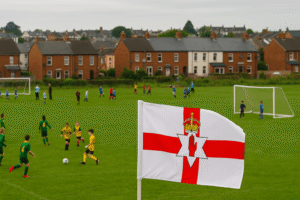
Grassroots Football and Youth Football in the UK: A Comprehensive Overview
Grassroots football is the beating heart of the UK’s sporting culture, nurturing young talent and bringing communities together from the ground up. In this post, we’ll break down what grassroots football is, how youth football is structured across England, Scotland, Wales, and Northern Ireland, and explain the rules, regulations, and governing bodies that shape the beautiful game at its most fundamental level.
What Is Grassroots Football?
Grassroots football refers to all non-professional football played at the local level in the UK. This includes children, teenagers, and adults participating for fun, fitness, and community spirit, rather than for money or fame. Youth football forms a key part of grassroots football, providing structured environments for boys and girls to learn the game and develop both on and off the pitch.
The Importance of Youth Football in the UK
Youth football in the UK isn’t just about winning matches—it’s about teaching teamwork, discipline, and respect. Across the UK, thousands of clubs offer opportunities for young people of all backgrounds to play, learn, and grow, fostering a lifelong love of football.
Structure of Grassroots and Youth Football in the UK
Grassroots football in the UK is typically organized into:
- Mini-soccer (ages 5–11): Small-sided games, focusing on skill development and fun.
- Youth football (ages 12–18): Progression to full-sided matches, with age-specific leagues and competitions.
- Adult amateur football: For those who continue playing for enjoyment, fitness, and social connection.
Grassroots Football in England
- Governed by The Football Association (The FA).
- Wide network of County FAs supporting local clubs and leagues.
- FA Charter Standard ensures minimum standards for clubs and coaches.
- Major investment in facilities and coach education.

Grassroots Football in Scotland
- Overseen by the Scottish FA (SFA).
- Regional associations deliver youth football programs.
- Scotland’s “Football for All” ethos focuses on inclusion and participation.
- Emphasis on player development pathways linked to Scottish Professional Football League (SPFL) clubs.

Grassroots Football in Wales
- Run by the Football Association of Wales (FAW).
- Structured leagues for boys and girls, with strong support for community clubs.
- FAW Trust provides resources, training, and safeguarding.
- Focus on accessibility and lifelong participation.

Grassroots Football in Northern Ireland
- Managed by the Irish Football Association (IFA).
- Youth football delivered through local clubs, schools, and community initiatives.
- IFA Grassroots Development Programme supports coaches, volunteers, and referees.
- Priority on growing girls’ and disability football.
Governance, Rules, and Regulations
Grassroots and youth football in the UK are governed by national football associations (FA, SFA, FAW, IFA), each setting their own rules and frameworks, but all prioritizing:
- Safeguarding: Strict policies to protect children and vulnerable adults.
- Coaching Qualifications: Coaches must hold approved qualifications.
- Respect Campaigns: Initiatives to promote respect among players, coaches, and parents.
- Equality & Inclusion: Ensuring football is open to all, regardless of background or ability.
Each country also follows FA Laws of the Game, with age-appropriate adaptations for youth football (e.g., smaller pitches, shorter matches, rolling substitutions).

The Role of Academies in Grassroots and Youth Football
Academies play a unique role in the UK football landscape, bridging the gap between grassroots football and the professional game. While grassroots football clubs are community-based and open to all, academies are typically operated by professional clubs and are designed to identify, nurture, and develop talented young players with the potential to progress to higher levels.
How Academies Fit into Grassroots Football
- Talent Identification: Many academies scout players from grassroots and youth football clubs, often inviting the most promising youngsters to join their development programmes.
- Partnerships: Professional club academies frequently form partnerships with grassroots clubs, offering coaching sessions, workshops, and access to better facilities to support local player development.
- Player Pathways: While only a small percentage of players progress to become professionals, academies provide structured pathways for those with exceptional ability, while ensuring that all young players continue to benefit from quality coaching and a supportive environment.
- Continued Participation: Not every child will move through the academy system, and many will return to or remain with grassroots clubs, bringing with them improved skills and experiences that enrich the local football community.
Grassroots and Academy Differences
- Accessibility: Grassroots football is open to all abilities and backgrounds, focusing on enjoyment, participation, and personal development. Academies, on the other hand, are selective and geared towards elite player development.
- Competition Structure: While grassroots clubs play in local leagues and festivals, academies often compete in dedicated academy leagues against other professional clubs.
Ultimately, both systems are vital. Grassroots football forms the foundation for participation, community, and growth, while academies offer aspirational opportunities for talented young players. Working together, they ensure a healthy, inclusive, and dynamic future for youth football in the UK.
Opportunities and Challenges
While grassroots football in the UK offers immense benefits—healthy lifestyles, social connections, talent development—it also faces challenges such as funding, facility access, and volunteer recruitment. National associations are working hard to address these and keep grassroots and youth football thriving.
Why Grassroots Football Matters
Grassroots and youth football are the foundations of the UK’s football pyramid. They produce future stars, unite communities, and make football truly “the people’s game.”
For more information, view our grassroots football FAQ’s
HOME | TOURNAMENTS | COACHING | PARTNERS | BLOG














